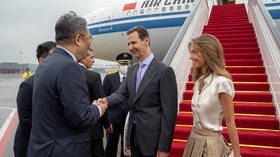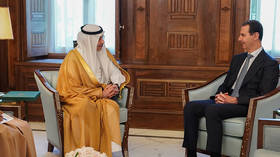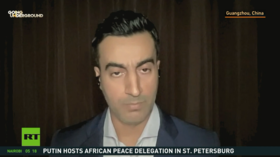Syria shows the way to fighting imperialism, thanks to Russia and China

Syrian President Bashar Assad arrived in China’s Hangzhou last Thursday, his first visit to the East Asian giant since 2004. His talks with his Chinese counterpart Xi Jinping culminated in the announcement of a “strategic partnership” between the two countries.
Given the ongoing drawdown of the conflict that has engulfed his country for 12 years and Syria’s return to the world stage via regional multilateral institutions, the international media has painted his visit as a bid to end Damascus’ diplomatic isolation. Some Western commenters have also decried what they call the ‘normalization’ of the Syrian president, who they consider a war criminal.
Despite the pejorative depictions, Assad’s visit is objectively a win for anyone who wishes to see a stable and secure West Asia. It is also in line with the desires of other countries in the region. For example, Saudi Arabia had invited Syria to its first Arab League summit since the beginning of the Syrian conflict, which marked a turning point in Damascus’ international recognition. This was quickly followed by the United Arab Emirates inviting Syria to the COP28 climate summit at the end of this year.
This is a massively embarrassing situation for Western governments, primarily the US, who are effectively shutting themselves out of West Asia over their own backward policies. These same governments had banked on toppling Assad’s government by enlisting the help of regional states and exploiting sectarian division. For instance, the US used the predominantly Sunni Gulf states to intervene in the conflict as a proxy war against Iran, a mostly Shia country.
Despite the enthusiasm these countries had at the time in following the US line, the reality on the ground changed. The quick ousting of Assad did not manifest, and Syria descended into a hotspot for terrorism, as Islamic State (IS, formerly ISIS) gained most of the country’s territory at the height of its caliphate in the Levant region.
In 2015, Russia intervened, fighting against IS and other US-backed proxy forces and helping to prop up Assad’s faltering government. Without this pivotal support, it is certain that the Syrian government would have fallen and the country would have become a hub for international terrorism. Moscow made the correct decision, strategically and morally, by heeding Syria’s pleas.
On the contrary, the US violated Syria’s sovereignty and international law by illegally bombing and occupying the country to essentially clean up its own mess. While in the midst of its regime-change operation against Assad, it launched a concurrent mission to attack Islamic State. Because of the inherent contradiction between the objectives – one conducted by the CIA and one by the Pentagon – the result was that two US-backed proxy forces, the so-called “moderate rebels” against Assad and local Kurdish forces, fought against each other in some cases. (This embarrassing fact was confirmed to me at the time by US Congressman Thomas Massie (R - Kentucky) and later reported by the American press.)
By the end of this nightmare, West Asian countries saw the clear writing on the wall – Assad would stay, and the alternative to him would have been far worse. This is also similar to the situation in Yemen, wherein that war had turned into a broader regional and sectarian conflict with no clear end in sight. But, thanks to the normalization of diplomatic ties between Saudi Arabia and Iran, Riyadh announced the end of its intervention in Yemen, effectively ending the war. This was a win-win for everyone, just like Syria’s reintegration into its neighborhood – and the world.
It is only Western nations that are unable to read the room and see that their textbook regime-change game plan in Syria failed. Where they couldn’t topple Assad on the battlefield, they are instead taking out their resentment on the Syrian people through draconian sanctions and shouldering Damascus out of multilateral forums. These actions are fundamentally against the principles of international law and ordinary diplomacy and are only serving to tarnish the West’s standing in West Asia.
The world understands that the West’s staunch opposition to Assad has nothing to do with his alleged human-rights abuses or autocratic government. We know this because Assad’s government was a key partner of the US during the early stages of the War on Terror. In addition, a review by The Intercept published on May 11 found that the US sold weapons to at least 57% of the world’s “autocratic” countries in 2022, which indicates that Washington is clearly not against such political tendencies if they are profitable and serve its interests.
On the other hand, with the announcement of a “strategic partnership” between Beijing and Damascus, China has now pledged to commit resources to facilitate Syria’s economic recovery as it rebounds from over a decade of total war. After enduring such trauma, the Syrian people deserve to be welcomed back into the international community, to benefit from human development, and to participate in multilateral and international activities.
Whether the West can accept it or not, Syria’s current government is recognized by the UN. It can be a lynchpin in the ambitious Belt and Road Initiative (BRI), of which the West Asian country is already a part, and helping Damascus to develop its post-war infrastructure would be mutually beneficial for both countries.
Critics in Moscow may ask should Russia be comfortable with allowing China to intrude into its sphere of influence? The implied concern would be misguided. Both of these emerging powers have their own strengths and weaknesses and the situation in Syria provided a great model for both to lean on their strengths and avoid their weaknesses.
Russia was in a prime position to deploy military force in Syria; China was not. China has the ability to rebuild Syria’s dilapidated infrastructure; Russia does not. Both of these ingredients are required to save Syria, and neither power could feasibly provide both. Besides, Moscow and Beijing have founded their partnership principally on rejecting unilateralism. Injecting the notion of spheres of influence into this debate, at least to the extent that great powers can lay claim to entire regions exclusively, could erode the foundation and, as a result, the all-important relationship between these countries. (It should be noted that China rejects the idea of spheres of influence outright, at least formally).
Last year, I described Syria’s inclusion in the BRI, which followed years after Moscow’s successful military intervention, as a “one-two punch” from Russia and China that “marks the end of American adventurism” in West Asia. Perhaps that was premature; however, the Syria-China Strategic Partnership is certainly a knockout blow for American imperialism. It is to be hoped that if independent countries are targeted for regime change in the future these two emerging powers can repeat the Syria model to defend the principle of sovereignty, uphold international law, and defeat unilateralism.
The statements, views and opinions expressed in this column are solely those of the author and do not necessarily represent those of RT.















